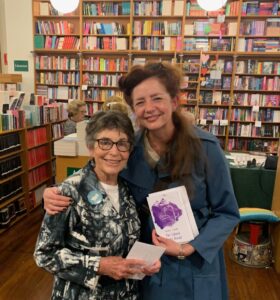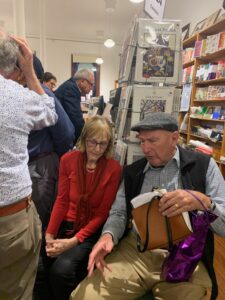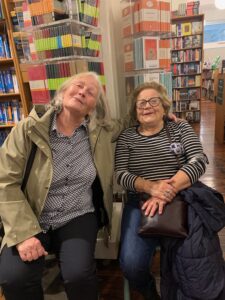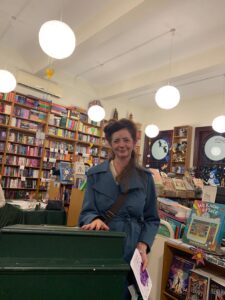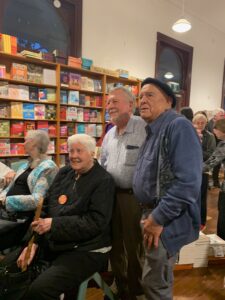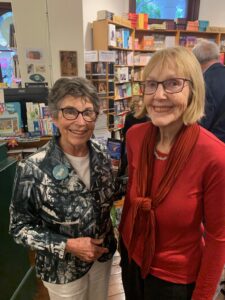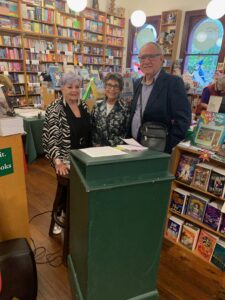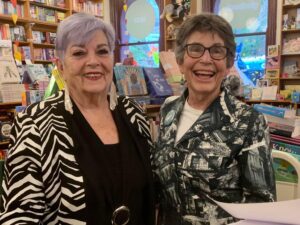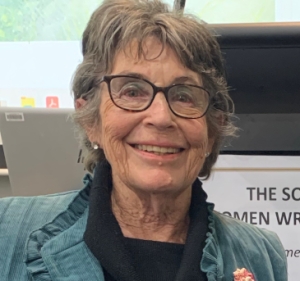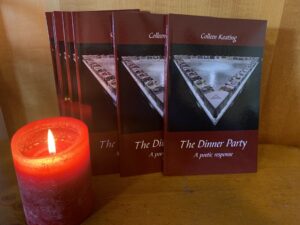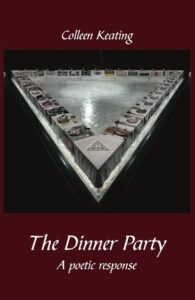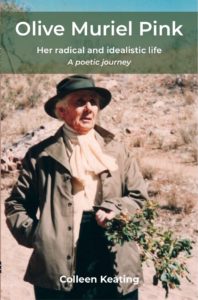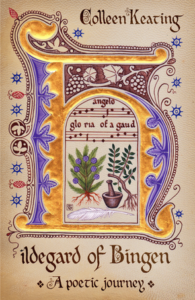HOLD ON TO RESILIENCE: COLLEEN KEATING LAUNCHES ‘NO SALAMI FAIRY BREAD’ BY BEATRIZ COPELLO
as published in the Rochford Street Review thanks to editors: Mark Roberts and Linda dair Octobrr 28th 2023
ROCHFORD STREET REVIEW
A Journal of Australian & International Cultural Reviews, News and Criticism.
The Launch of No Salami Fairy Bread by Beatriz Copello : launched on the 6th October 2023 by Colleen Keating at Gleebooks, Sydney.
Thank you Angela . I too, gratefully acknowledge and pay respects to our First Peoples. We are reminded of the deep history of the lands, on which we meet and I too support a yes to the constitutional voice from the Uluru Statement from the Heart.
Friends, It’s a privilege to be asked by Beatriz to launch her new collection of poetry, No Salami Fairy Bread and I hope you all get a chance to buy a copy and enjoy reading this
poetic journey. The cover is very smart and the feel of the book is gorgeous. You must be proud Beatriz and we are delighted for you and we are here as your supporters.
I would like too to acknowledge Ginninderra Press for their dedication to poetry and for publishing this powerful story.
Dr. Beatriz Copello is a published Australian writer, poet, playwright and psychologist with a rich and colourful Argentinian heritage. Her fiction and poetry have been published nationally and internationally, in literary journals such as Southerly and Australian Women’s Book Review, and in anthologies and feminist publications.
There are many of you here who know Beatriz in different ways, family, friends, colleagues, and from her writing life. I know Beatriz in that capacity a fellow poet. . . she is an awesome reviewer of books and I have found her to be fair, affirming and astute especially as our touchstone and affirming bond has been in feminist writing
And this evening how special to gather to acclaim Beatriz ’s latest poetry collection No Salami Fairy Bread. This is not an ordinary collection of poetry . It is the story of a life in poetry, a funny and poignant story written in poetic form. It follows the poets migratory life as a young woman, without English, who had to carry the early resistance of family shown in an early poem Dolls:
‘Mum, I want to take to Australian
my doll Pepita and the one that walks
also, the one that wees . . .
and you know
I cannot sleep with out my teddy’
‘Only one dolly you can take.
You must choose with care’
‘I hate Australia. I don’t want to go.
I want to keep all my dolls.
Why can’t we stay here.?’
She was mother, daughter, sister, wife and lover becoming a modern woman through adversity, life’s struggles hopes and at times despair. It is about a dream of living a free life in a new country.
As Beatriz will admit she was no saint facing the challenges of Sydney in the 70’s even with the challenge of fidelity as she struggled to be an independent modern woman embracing a new culture within the beautiful city of Sydney It is a page turner as we follow how the poet made her dream a reality. The story of braving the journey to a new world bringing her family with all the ups and downs that entails.
And finally on a bigger scale it is about diversity and inclusivity. i will read a little from the poem Defiance:
Don’t tell your in-laws
that you work as a waitress
dressed up as an Indian. They’ll
think we have all gone mad
. . .and your husband
he’s so angry and annoyed.
Give up that silly job!’
Recriminated my mother. . . .
‘Your husband will leave you,
your children will hate you.
You’ll be left in your own.’
‘I know what i want.
I know where I’m going.
don’t worry about me. . .
Some of the poems are very cutting and painful and I love the immediacy of poetry and how it makes you feel as you read.
In one poem she writes:
I lie in bed as if shrouded
by the clean white sheets.
i am dead to my past,
alive in the present
breathing in new sensations,
excitement, surprises
the joy of the new. … and with fright I shiver
What have I done?
i have dragged my whole family
into a world so foreign
so different, so unusual. . .
One of the great gifts of poetry is its ability to explore and hold the paradox between anticipation, fear, betrayal, hope, joy, acceptance .
I love the the new awareness in poems like It’s Time.
The tea lady is wearing
a badge on her coat.
it says IT”S TIME.
and later,
we sit on the patio
of the pub next door
and we drink beer and smoke.
She tells me of Whitlam
his vision and dreams . . ‘
You should know about Al grassy
he is all for the ‘wogs .
I will read one last poem I Learnt :
. . .And I went to that session
and more, many more.
I learnt about exploitation
about men’s intentions,
their power, their control
and the way in which women were oppressed .
I marched in the streets
carrying banners tat said,
Not the church
not the state
let the women
choose their fate. The girls enjoyed the chanting
when I took them on our marches. I shocked my husband
mu mother, my family
with all my new beliefs.
As time passed, I realised
that my life was only mine.
I packed a case for the girls and I
and we left for a new life,
somewhere in Ryde,
near Macquarie , my uni
where i had been accepted
to study for a BA
majoring in Psychology
We are privileged to be part of this unfolding journey, the future becoming of a young naive woman who looked into an unknown future, and stepped out, held on to a resilience to keep moving forward like the the story of the cocoon to a beautiful butterfly with silver wings that become stronger and stronger .
We know the end of this story as we have the resilient and lovingly beautiful Dr. Beatriz Copello here with us today .(Call Beatriz forward)
However You will have to buy and read No Salami Fairy Bread to find out how this brave woman made it to be standing here next to me today.
Let’s now celebrate the hard and lonely journey of writing. Beatriz is a beacon of hope for us all on our journeys and for many of us as writers – a reminder that we are all travellers on this remarkable journey of life seeking our own ‘fairy bread’ our own place of acceptance and our own home , Please join with me in congratulating Dr. Beatriz Copello as we together launch and welcome her new poetry book No Salami Fairy Bread.
Colleen Keating
Colleen Keating is a Sydney-based poet. Her writing explores the paradox and wonder of nature with harsh realities of life, justice , equality and the increasing threat to our natural environment. Colleen has published six collections of poetry, including two award-winning verse novels, Hildegard of Bingen: A poetic journey and Olive Muriel Pink: her radical & idealistic life. Her newly published book (2023) is The Dinner Party: A poetic reflection with Ginninderra Press. Colleen writes on Ku-Ring-Gai land in Sydney and Darkinjung on the Central Coast of NSW.
No Salami Fairy Bread by Beatriz Copello is available from Ginninderra Press
